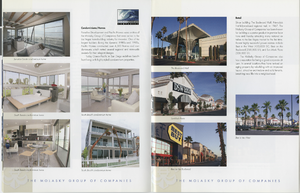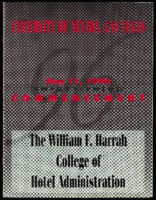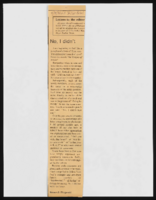Search the Special Collections and Archives Portal
Search Results

Brochure from the Molasky Group of Companies, approximately 2010
Date
Archival Collection
Description
This brochure includes highlights of the Molasky Group of Companies, specializing in real estate development.
Text

Lucela M. Wattin oral history interview: transcript
Date
Archival Collection
Description
Oral history interview with Lucela M. Wattin conducted by Stefani Evans on December 6, 2021 for Reflections: The Las Vegas Asian American and Pacific Islander Oral History Project. Lucela shares memories of her life growing up in Cebu Province, Philippines and being raised by her mother and grandparents after her father's death. She talks about immigrating to the United States under her fiancée's visa, moving to Chinatown in Las Vegas, and her work as a busser at the Excalibur Hotel. Lucela discusses how joining the Culinary Workers Union improved her work conditions and benefits, and how she is working with the union and a legal attorney to help her daughter immigrate to America. She also shares her favorite Filipino dishes (sinagang, chicken adobo, and bugas mais), holiday traditions, and what life was like when casinos shut down during COVID-19.
Text

William S. Boyd School of Law building dedication program
Date
Archival Collection
Description
Folder contains program of a building dedication for the William S. Boyd School of Law at the University of Nevada, Las Vegas. From the University of Nevada, Las Vegas William S. Boyd School of Law Records (UA-00048).
Text

University of Nevada, Las Vegas (UNLV) William F. Harrah College of Hotel Administration 33rd commencement program
Date
Archival Collection
Description
Commencement program from University of Nevada, Las Vegas Commencement Programs and Graduation Lists (UA-00115).
Text

"The Reintegration of Las Vegas": paper by Roosevelt Fitzgerald
Date
Archival Collection
Description
From the Roosevelt Fitzgerald Professional Papers (MS-01082) -- Unpublished manuscripts file. Presented at the Western Social Science Association, 31st Annual Conference, Albuquerque, New Mexico.
Text

Untitled, Martin Luther King holiday: manuscript draft by Roosevelt Fitzgerald
Date
Archival Collection
Description
From the Roosevelt Fitzgerald Professional Papers (MS-01082) -- Unpublished manuscripts file.
Text

Lauren M. Brown oral history interview: transcript
Date
Archival Collection
Description
Oral history interview with Lauren M. Brown conducted by Claytee D. White on February 21, 2018 for the Remembering 1 October Oral History Project. In this interview, Lauren M. Brown discusses her history with Las Vegas, Nevada, starting from when she moved to the city in 1997. She describes her experience as one of the many who stood in line to donate blood on October 2, 2017, the day after the 2017 Las Vegas mass shooting. Brown talks about what stood out on that day, including the overwhelming amount of people waiting to donate blood and the people who brought drinks and pastries for those waiting. She speaks about how that day showed her the heart of Las Vegas and changed her perspective of the city. Brown also discusses her correspondence with the Healing Garden to give ideas for the design of a permanent memorial for the tragedy.
Text

Stefani Evans oral history interview: transcript
Date
Archival Collection
Description
Oral history interview with Stefani Evans conducted by Claytee D. White and Barbara Tabach on November 21, 2017 for the Remembering 1 October Oral History Project. In this interview, Stefani Evans discusses how she moved to Las Vegas, Nevada in 1980 with her husband and her feelings associated with the city, especially after the 2017 Las Vegas mass shooting. She describes in detail how she found out about the traumatic event as well as her experience of waiting all day to donate blood on October 2, 2017, the day after the shooting. Mostly, Evans explains with emphasis the good of humanity that she witnessed during the aftermath of that tragedy.
Text

Mabel Hoggard: newspaper clippings and school records
Date
Archival Collection
Description
Folder of materials from the Mabel Hoggard Papers (MS-00565) -- Personal papers file. This folder contains materials about Mabel Hoggard, including a Las Vegas Sentinel newspaper issue, newspaper clippings, a decree of divorce (Mabel E. Wims vs Irvin E. Wims), a memorial service program (Mabel Welch Wims Hoggard, March 10, 1905- May 31, 1989), and U.S. Congressional Records recognizing the achievements of Mrs. Mabel W. Hoggard. Mabel Hoggard's student records were not digitized per the Special Collections and Archives restrictions policy.
Mixed Content

Don Perry interview, March 05, 1978: transcript
Date
Archival Collection
Description
On March 5th, 1978, Karen Croteau interviewed Don Perry (b. 1928 in Clarksburg, West Virginia) about Paiute Indians and life on a reservation. Perry begins by mentioning his own Indian heritage with a Cherokee mother and his wife’s Paiute heritage. Perry focuses on his conversations with his wife’s grandmother, who lived on the Paiute reservation since birth, from who he learned about the reservations history. He particularly delves into the traditions of Indian burials, governing on the reservation, and the difference between an Indian reservation and an Indian colony. Additionally, he talks about recreation on the reservations, education of Paiute Indians, and how reservations have changed. Throughout the interview, Perry gives personal anecdotes about his life in connection to the Paiute people and his experiences with their traditions and belief systems. Perry ends by discussing governing politics of the Paiute reservation and the start of Las Vegas as a gambling town.
Text
